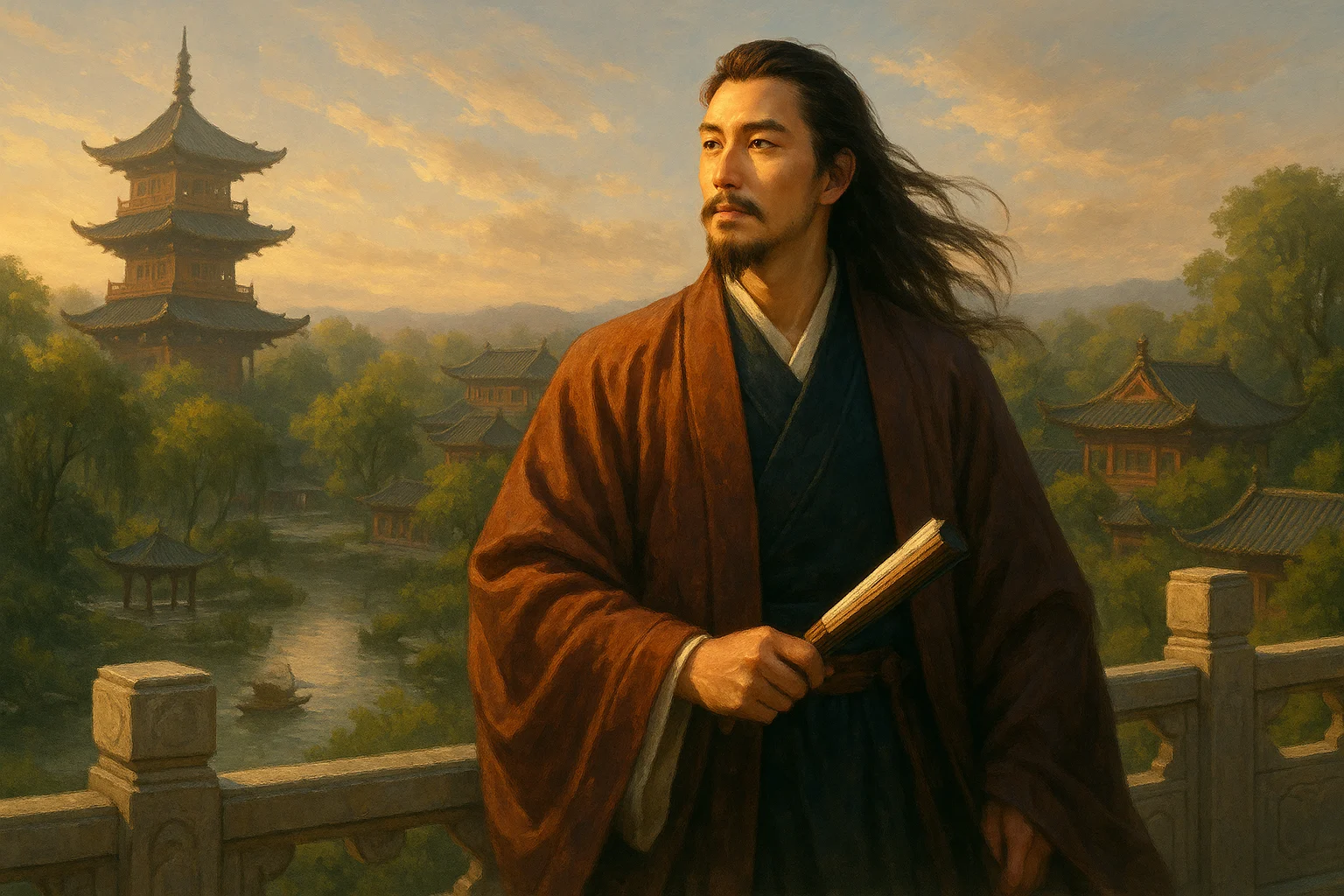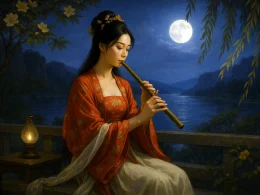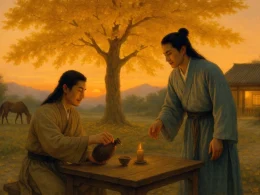Mid-month lanterns fold their glow,
Peaks erupt in blooms' tableau.
Word comes—Jian Pavilion's drowned,
On old nag,
Through mist I seek friends unbound.
Sweep monk's bed, lift plain drape high,
Canyons breathe spring's lullaby.
Pines play grief's relentless tune—
Dreams bisect—
West window sun still ends too soon.
Original Poem
「渔家傲 · 灯火已收正月半」
灯火已收正月半,山南山北花撩乱。
闻说洊亭新水漫,骑款段,穿云入坞寻游伴。却拂僧床褰素幔,千岩万壑春风暖。
王安石
一弄松声悲急管,吹梦断,西看窗日犹嫌短。
Interpretation
This ci poem was composed during Wang Anshi's retreat at Dinglin Temple in Zhongshan. Having resigned from his position as chancellor, he resided in the outskirts of Jiangning, finding solace in nature and a life of leisure. The poem vividly captures his spring outings while dwelling in the mountain temple, blending authentic depictions of natural scenery with the poet's psychological state of serene solitude tinged with loneliness. Written in refreshingly simple language with straightforward scenic descriptions, its lofty and unrestrained style stands unique among Northern Song ci poetry.
First Stanza: "灯火已收正月半,山南山北花撩乱。闻说洊亭新水漫,骑款段,穿云入坞寻游伴。"
Dēng huǒ yǐ shōu zhēng yuè bàn, shān nán shān běi huā liáo luàn. Wén shuō Jiàn tíng xīn shuǐ màn, qí kuǎn duàn, chuān yún rù wù xún yóu bàn.
Lantern lights dimmed—the first month half gone,
mountains north and south blaze with riotous blooms.
Hearing of Jian Pavilion's newly swollen streams,
I mount my ambling donkey,
penetrate clouds, enter valleys—seeking companions.
This stanza paints the poet's spring excursion after the Lantern Festival, showcasing the lush spring scenery of Jiangnan's mountains. "Riotous blooms" (花撩乱) vividly depicts nature's overwhelming abundance, while "ambling donkey" (款段) reflects the poet's leisurely pace. The consecutive verbs—"penetrate," "enter," "seek"—vividly convey his determined, carefree spirit in pursuing spring's delights.
Second Stanza: "却拂僧床褰素幔,千岩万壑春风暖。一弄松声悲急管,吹梦断,西看窗日犹嫌短。"
Què fú sēng chuáng qiān sù màn, qiān yán wàn hè chūn fēng nuǎn. Yī nòng sōng shēng bēi jí guǎn, chuī mèng duàn, xī kàn chuāng rì yóu xián duǎn.
Returning, I dust the monastic bed, lift plain curtains—
thousand crags, endless ravines warmed by spring breeze.
Pine whispers play like mournful urgent pipes,
blowing my dream apart.
Westward window's sun—still I begrudge its brevity.
This stanza shifts to post-excursion repose in the temple. The opening "returning" (却) pivots from outdoor revelry to indoor stillness. "Pine whispers like mournful pipes" (松声悲急管) transforms natural sounds into emotional music, reflecting the poet's unspoken melancholy. The closing lament about the "sun's brevity" (犹嫌短) reveals lingering wistfulness beneath his tranquil lifestyle.
Holistic Appreciation
The entire poem resembles a bright yet subtly layered spring landscape painting, or a spiritual stroll steeped in quiet profundity. The first stanza chronicles a spring outing, while the second depicts temple repose—a tightly structured progression mirroring Wang's mountain-dwelling retirement.
The contrast between "lanterns dimmed" and "riotous blooms" creates a dynamic interplay of stillness and vibrancy, crafting an ethereal "tranquility-after-revelry" atmosphere. Imagery like Jian Pavilion, misty valleys, spring waters, and clouds enhances the scenery's secluded beauty. The poet's donkey ride embodies the Song literati's ethos of "harmonizing with nature" (与物偕忘).
Yet the second stanza's "dream blown apart" and lament over fleeting time betray an undercurrent of unrest. Though physically withdrawn, Wang's mind remains incompletely settled—this poignant tension between transient beauty and unfulfilled longing forms the poem's most moving dimension.
Artistic Merits
- Unadorned scenic depictions with refined simplicity:
The poem employs minimal embellishment, using straightforward language to sketch vivid, picturesque scenes. - Precise and dynamic verb usage:
Phrases like "penetrate clouds," "enter valleys," "dust the bed," and "lift curtains" deploy simple yet potent actions to animate the poet's experiences. - Natural transitions and scene-emotion fusion:
Despite shifting moods between stanzas, the rhythm remains cohesive, creating a multidimensional panorama of movement and stillness. - Thoughtful melancholy beneath surface tranquility:
While ostensibly recording leisure, the interrupted dream and resentment of waning daylight reveal deeper psychological complexity.
Insights
This poem reveals Wang Anshi's late-life duality—physically immersed in nature yet mentally unsevered from worldly concerns. It reminds us that even the most reclusive existence may harbor unspoken preoccupations. Through nature's beauty, humans achieve temporary reconciliation with the world, grasping moments of peace. This tension between life and spirit epitomizes Wang's tripartite identity as statesman, philosopher, and poet.
About the Poet

Wang Anshi (王安石 1021 - 1086), a native of Linchuan in Jiangxi, was an outstanding statesman, writer, and thinker of the Northern Song Dynasty, counted among the "Eight Great Prose Masters of the Tang and Song Dynasties." His poetic achievements were particularly profound—his early works, filled with heroic language, revealed the ambition of a reformer. Though his ci poetry was few in number, it pioneered new realms of historical reflection. His poetry and prose combined intellectual depth with artistic value, and the over 1,500 works preserved in The Collected Works of Linchuan stand as a monumental testament to literary innovation in Song Dynasty literature.












